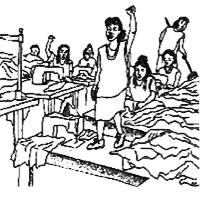|
I recently got a job in a small clothing factory in Los Angeles, where
we make shirts that sell for $56 dollars each. The cutter gets $1.20 each and the sewer
gets $2.50 per shirt. The rest goes to cloth, rent, air-conditioning, a few
other expenses, and, of course, big profits—close to a million dollars
per season.
Last Wednesday the boss got the air-conditioning bill, and decided, in
the middle of a heat wave, to turn off the a-c for the workers while keeping it
on in her office. Rivers of sweat
were pouring off of me, and some of the women started getting dizzy. One of the
women put a wet towel from the restroom on her head to cool off, and the boss
told her she was making a mess on the floor and to put it back. 
I heard scissors slam on the table, and Marcia said, "That's it!" She
went from worker to worker, and told everybody, "Turn off your machine! We're
walking out!" Although some hesitated at first, we all walked out together.
"She can't do anything without us!" Marcia told us as we left the factory and
walked to the bus.
On Thursday, the boss called an emergency meeting. Before she could even
begin, Marcia made a speech. She confronted the boss,
telling her, "You just sit there and
look pretty, while we, who are the base of your profits, are killing ourselves
in the heat. And you deserve to have a-c?"
The boss asked us, "What exactly do you want?"
"Turn the a-c on or we're all walking out again!" was her response.
She turned it back on—but at 80 degrees for us, while her office
was still like an icebox.
On Monday morning, the boss called a company meeting—with one
thing on the agenda. "Have you noticed," she asked, "that Marcia isn't with
us? It wasn't working out, so I had
to let her go."
"Why?" asked another worker.
"It's confidential," answered the boss. But she wasn't fooling anybody.
She did, however, scare a lot of people—as if they weren't already
scared enough.
If we hadn't all been so scared, we would have spoken up with Marcia
during the emergency meeting on Thursday.
It would have been a lot harder for the boss to take it out on all of
us. Since Marcia was the only person who spoke up, she was an easy target.
Another lesson is about the need for a plan—and collective
political struggle. Individual
heroism only gets us so far. We've got
air-conditioning (at 80 degrees), but we're all so scared now that she can turn
it off any time she wants. Also, in these types of struggles our goal should be
to politically educate the workers about the nature of capitalism and pull them
away from fighting for crumbs but instead struggle with them to mobilize for
communism.
This was a real learning experience for me. I've been in ICWP for four
years, but this is my first factory job. This was my first time being involved
with workers in class struggle on the job.
Before this happened, I could see that the woman who led the walk-out was somebody I should give Red Flag to. I was trying
to figure out how to do it—fearing how she might react. Turns out, when I
gave her the paper, she told me that she and her husband had been involved in
the guerrilla in El Salvador. Communist ideas were not strange to her.
The lessons of the fmln in El Salvador and the fight for air
conditioning in Los Angeles are the same: fighting for reforms gets us nowhere.
Workers around the world are fighting back but they need communist analysis and
a plan that doesn't get stuck in reformism. In a communist world,
everything—even air conditioning—will be distributed according to
our needs. No one will sit in a cool office while others are sweating. No one
will live in luxury while others are starving. We'll share what we produce for
the good of all.
--Young Comrade
| 
